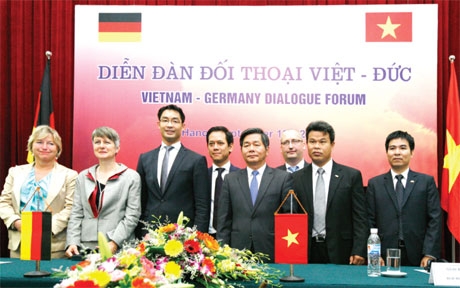Vietnam-born Roesler points the way ahead for growth

While meeting with Prime Minister Nguyen Tan Dung and holding talks with Minister of Planning and Investment Bui Quang Vinh on his official visit to Vietnam from September 17-19, Vietnam-born German Federal Minister of Economics and Technology Philipp Roesler said Germany coveted new opportunities in cooperating with Vietnam in the health care, energy, and education and training sectors.
“Germany has much experience and modern technologies to develop these sectors which are greatly needed by fast-industrialising Vietnam,” Roesler said, referring to 56 representatives from Germany’s leading firms accompanying his visit to Vietnam.
When Klaus Hellmann, general director of German-invested Hellmann Worldwide Logistics GmbH & Co.KG, asked Minister Vinh to allow this company to implement a public private partnership (PPP)-based logistics project in Vietnam’s health care sector, Roesler proposed Vinh to establish a task force on Germany-Vietnam PPP with this project to be piloted. Members of the task force would come from the German Embassy to Vietnam and the MPI. “If this project succeeds, more Germany-Vietnam PPP projects in other sectors will be implemented,” Roesler said.
In response, Vinh said: “That’s a very good idea and the MPI wholly supports it, because PPP in the health care sector is quite new in Vietnam. It is not so difficult to establish this task force. Capital for operating this task force will come from an Asian Development Bank-backed fund used for PPP projects in Vietnam.”
Roesler said German enterprises also wanted to help the Vietnamese government implement its energy development strategy and apply smart energy technology.
“Vietnam has lots of potential of wind power and renewable energy. But manufacturing of these energy sources needs a large amount of investment capital and should be suitable with the economy’s growing demand. It will be a good and intelligent solution if Germany and Vietnam can cooperate in this industry,” said Roesler.
Siemens Vietnam and Vinamotor on the occasion of Roesler’s visit signed a contract for manufacturing an ELFA hybrid bus prototype.
The two companies entered a cooperation agreement in June 2012 to apply Siemens ELFA® hybrid drive technology for city buses in Vietnam. Siemens would supply all necessary ELFA components and provide technical support while Vinamotor would prepare the platform and manufacture remaining parts of the bus for operational readiness. With the Siemens technology, city buses could reduce fuel consumption by 50 per cent and mitigate impacts on the environment through lower exhaust emission.
Pekka Paasivaara from Germanischer Lloyd said his company had been operating in Vietnam for over 20 years and “will focus more on recycle energy projects in the country, which boasts great potential in wind energy.”
However, both Roesler and German enterprises said German investors were waiting for clearer investment legal mechanism in favour of investors in the energy sector. “For instance, wind power price is far lower than production costs. This cannot help Vietnam attract more foreign investors into developing wind power projects,” Paasivaara said.
As for education and training cooperation, many enterprises like Hellmann, Siemens and Metro Cash & Carry said they would help Vietnam’s government produce skilled employees via their training centres and courses. “We will also open a health care training centre in Vietnam and need the government’s support,” Hellmann said.
Roesler said Germany would have more training programmes in Vietnam in the coming times. On this occasion, he witnessed the opening of Ho Chi Minh City-based Germany-Vietnam High School and Germany-Vietnam Technology Centre in charge of research and training Vietnamese engineers.
Also on this occasion, Vietnam’s Construction Ministry and Schwabisch Hall Germany, which is Germany’s largest home savings and loan company, signed a memorandum of understanding on cooperation.
Germany is currently Vietnam’s number one European trade partner, which occupies 19 per cent of Vietnam’s total export turnover earned from the EU market. The two nations’ two-way trade turnover reached $6 billion last year. Up to late August, 2012, there were 184 German investment projects in Vietnam, with total registered capital of $904 million.
Vietnam and Germany forged a strategic partnership in October, 2011 when Germany’s Chancellor Angela Merkel paid an official visit to Vietnam.
What the stars mean:
★ Poor ★ ★ Promising ★★★ Good ★★★★ Very good ★★★★★ Exceptional
Related Contents
Latest News
More News
- Foreign fruits flood Vietnamese market (December 09, 2025 | 13:22)
- Vietnam’s fruit and vegetable exports reach $7.8 billion in first 11 months (December 05, 2025 | 13:50)
- Vietnam shapes next-generation carbon market (November 26, 2025 | 15:33)
- PM urges Ho Chi Minh City to innovate and remain Vietnam’s economic locomotive (November 26, 2025 | 15:29)
- Experts chart Vietnam's digital finance path: high hopes, high stakes (November 14, 2025 | 10:56)
- Vietnam’s seafood imports surge 30 per cent in first 10 months (November 10, 2025 | 19:35)
- Vietnam’s durian exports hit $1 billion milestone (October 30, 2025 | 17:41)
- Beyond borders: Sunhouse and new era of Vietnamese brands on Amazon (October 28, 2025 | 10:46)
- Record-breaking trade fair set to open in Hanoi (October 15, 2025 | 15:59)
- Timber sector seeks solutions to VAT refunds (October 14, 2025 | 18:58)

 Tag:
Tag:


















 Mobile Version
Mobile Version